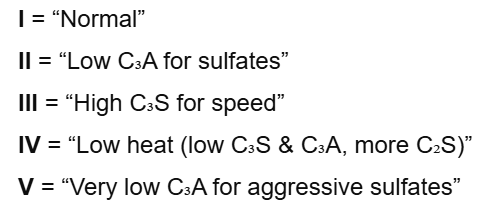Concrete Exam 1: Aggregates, Cements
1/16
There's no tags or description
Looks like no tags are added yet.
Name | Mastery | Learn | Test | Matching | Spaced |
|---|
No study sessions yet.
17 Terms
4 components of Cement
Lime/limestone (calcium)
Silica (clay/sand)
Iron (scrap metal/tires)
Alumina (often in clay)
Gypsum (sulfate)
Manufacturing phases of cement
Silicates - C2S and C3S
Aluminates - C3A and C4AF and Alkalis (Na & K)
cement clinker mfg in rotary kiln
Concrete components and vol%
PCC (7-15%) + Water (15-20%) + Sand (25-30%) + Coarse Agg(30-50%) + Air (3-5%)
Type I Cement
Ordinary PCC, normal proportions
Type II Cement
Moderate sulfate resistant & moderate low heat cement
Low C3A makes sulfate resistant and lower heat
Type III Cement
High early strength cement
Higher C3S and finer grind → higher early strength
Type IV cement
low heat cement
low C3S and C3A → less heat formation
Type V Cement
Sulfate resistant cement
very low C3A → best sulfate resistance
Types of Cement

Cement mfg process
Raw mix → Dehydration Zone → Calcination Zone → Clinkering Zone (melt forms with Alumina & Iron acting as flux for C3S formation) → Clinker out to grinding
Why add gypsum (sulfate)
helps offset undesirable effects of Al & Fe
keeps temp under control in hydration
AAR (Alkali-Aggregate Reactivity) - #1 concern for aggregate durability
ASR creates a gel that expands and fractures concrete and is similar to freeze-thaw damages due to expansion
Alkali(Na & K) + Silica (minerals in aggregates) → ASR
ASR needs 1) reactive silica in aggregate 2) sufficient alkali in cement 3) sufficient moisture in concrete
Solutions for ASR
-identify and avoid problematic aggregate sources
-ASTMs for testing aggregate with an expansion threshold
-minimize water exposure
-minimize pore space/voids
Mixture proportioning considerations
economy of matls, labor, and equip
workability
f’c (comp strength), w/c ratios, ASR resistant, etc
V(fine agg) = V(y=total vol) - (Vair+Vcement+Vwater+Vcoarse agg)
What can too little Gypsum cause?
too little gypsum leads to flash setting (setting in the truck nonreversible) b/c too little gypsum to slow down hydration reaction
*gypsums role is to slow down hydration reaction
What if gypsum gets too hot?
Leads to false setting (reversible) due to formation of gypsum crystals/dehydration